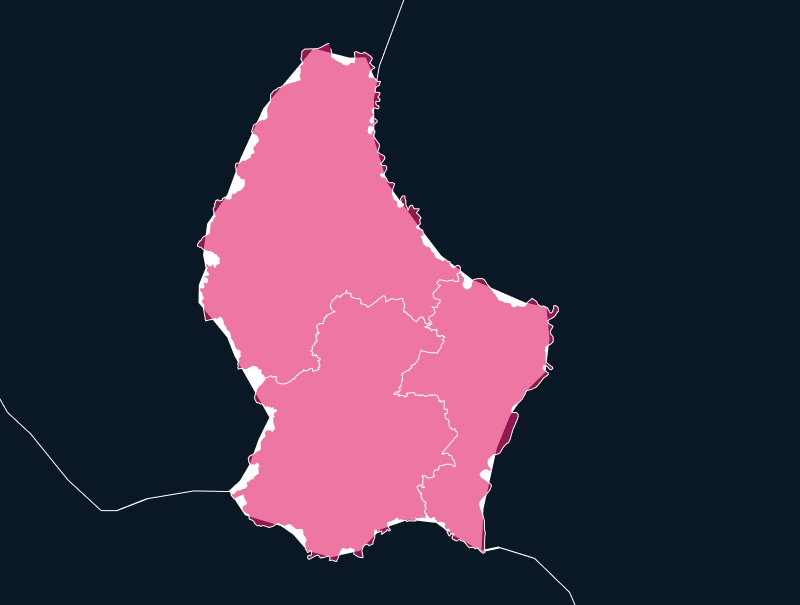Europe
Luxembourg Exports and Imports
Luxembourg, though small in geographical size, plays a significant role in global trade. Strategically located at the heart of Europe, this prosperous nation acts as a hub for international business, from financial services to high-tech industries. But while the country presents a wealth of opportunities, it also brings unique challenges, especially when it comes to import and export compliance.

Tax
Up to 17%
Duties
Up to 7%
Lead Times
1-2 Weeks
Restricted Items
N/A
Best Carrier Option
Freight Forwarder or Courier
Non-Working Days
Saturday, Sunday, and Public Holidays
Prominent Languages
Luxembourgish; French
Luxembourg’s Role in Global Trade
When you think of Luxembourg, finance likely comes to mind. The country is a prominent global financial center, home to a large number of banks, investment firms, and insurance companies. But Luxembourg’s role in trade extends far beyond the financial sector. The country has positioned itself as a key player in both European and global trade routes.
Luxembourg’s exports largely revolve around machinery, refined petroleum products, and chemicals. It’s also a significant hub for tech and digital services. Despite its size, Luxembourg’s highly skilled workforce, competitive tax regime, and stable political environment make it an attractive location for foreign companies, especially in the tech and fintech industries.
Similarly, Luxembourg’s imports are diverse, with machinery, chemicals, food, and consumer goods coming in from its neighboring countries and beyond. Trade within the EU is relatively straightforward, thanks to the common market and customs union. But challenges arise when dealing with non-EU countries, where businesses face more stringent customs procedures, documentation requirements, and regulatory hurdles.
Population
0.68 M
Biggest Industry by Export
Iron Blocks
Capital City
Luxembourg City
Biggest Industry by Import
Cars
VAT Recovery in Luxembourg | A Hidden Opportunity
For many international businesses operating in Luxembourg, VAT recovery is an often-overlooked but crucial aspect of trade compliance. Luxembourg, like other EU countries, has a VAT system that allows businesses to reclaim VAT on imports, which can represent a significant cost-saving opportunity. However, navigating the VAT recovery process can be complicated, especially for companies that aren’t familiar with Luxembourg’s specific tax codes.
The VAT refund process in Luxembourg requires businesses to file accurate documentation, meet strict deadlines, and follow the correct procedures to ensure that VAT paid on imports is fully refunded. For foreign companies unfamiliar with Luxembourg’s VAT recovery system, the process can be time-consuming and prone to errors. Mistakes in filing or missing a deadline can lead to lost opportunities for refunds and added costs for the business.
This is where an expert partner, like TecEx, can be invaluable. We help businesses streamline their VAT recovery process by ensuring that all the necessary documentation is filed correctly and promptly. Our team works with you to ensure that your business maximizes VAT refunds, which ultimately improves your cash flow and reduces overall costs.
Top Countries that Trade with Luxembourg
Europe
France
Europe
Belgium
Trade Compliance Challenges in Luxembourg
While Luxembourg is considered a business-friendly country, its trade compliance landscape presents several hurdles that businesses need to navigate.
One of the biggest issues businesses face when importing or exporting goods to Luxembourg is the management of trade data. Companies must deal with large volumes of data from multiple systems—whether it’s from their accounting software, trade management tools, or customs systems. The complexity of integrating these data sources can lead to inefficiencies and errors. Moreover, businesses need to ensure that all their data is both accurate and secure, which can be challenging when managing sensitive trade information.
Another significant challenge is regulatory complexity. Luxembourg’s trade compliance is governed not just by national regulations but also by EU-wide rules. For example, companies must adhere to the EU’s sanctions and export controls, which regulate the movement of sensitive goods and technologies. Exporters in Luxembourg, particularly those in the high-tech and defense sectors, need to be constantly aware of these regulations to avoid penalties or delays in shipment. The rules are often complex and continuously evolving, meaning businesses must invest significant time and resources into staying compliant.
In addition to this, customs procedures can be particularly cumbersome. While the EU’s internal market makes trade easier between member states, when it comes to imports from outside the EU, Luxembourg businesses face an entirely different set of regulations. Customs documentation can be time-consuming, and even a minor error in paperwork can cause delays in clearance or result in fines. This creates friction in supply chains, particularly for companies dealing with high-value or time-sensitive goods.
Overcoming Luxembourg’s Compliance Challenges with TecEx
Luxembourg’s favorable business environment offers significant trade opportunities, but navigating the complex web of import and export regulations can be a daunting task. From data management to VAT recovery and evolving trade controls, the challenges are real.
Fortunately, TecEx provides a tailored solution to help navigate the hurdles of import and export compliance. Whether you’re new to Luxembourg or have been trading in the region for years, we offer the expertise and technology needed to ensure your business stays compliant while saving you time and resources.
Our Delivered Duty Paid (DDP) service takes the stress out of the import process. We manage all aspects of customs clearance, from filing the correct documentation to ensuring that taxes and duties are paid. This end-to-end solution eliminates the headache of navigating customs processes, allowing you to focus on your core business operations.
When it comes to VAT recovery in Luxembourg, we specialize in ensuring that your business receives the maximum VAT refund possible. By handling the complex paperwork and staying up-to-date with Luxembourg’s VAT policies, we make the VAT recovery process as seamless as possible for your business.
With our support, your business can stay ahead of regulatory changes, ensuring that you’re always in compliance.
Clear Luxembourg Imports and Exports
Whether it’s handling the intricacies of customs, facilitating VAT recovery, or providing guidance on evolving regulations, TecEx offers the specialized solutions your business needs to thrive in Luxembourg’s dynamic trade environment.



